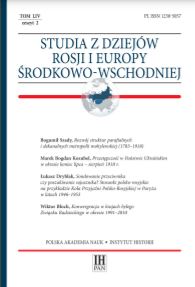Przestępczość w Państwie Ukraińskim w okresie koniec lipca - sierpień 1918 r. - analiza na podstawie wybranych materiałów Centralnego Państwowego Archiwum Wyższych Organów Władzy i Administracji Ukrainy w Kijowie
Crime in the Ukrainian State between the End of July and August 1918 - An Analysis Based on Selected Materials from the Central State Archives of Supreme Bodies of Power and Government of Ukraine in Kyiv
Author(s): Marek Bogdan KozubelSubject(s): History of Law, Criminology, Pre-WW I & WW I (1900 -1919)
Published by: Instytut Historii im. Tadeusza Manteuffla Polskiej Akademii Nauk
Keywords: Ukraine; Ukrainian State; history of judicial system of Ukraine; history of law enforcement authorities; history of crime; history of law and statehood;
Summary/Abstract: Following the treaty concluded on 9 February 1918 in Brest-Litovsk, the German and Austro-Hungarian Armies entered Ukraine as its allies in the war against Bolsheviks. Relations between the Quadruple Alliance states and the Ukrainian People’s Republic, however, were not harmonious. For this reason, the Germans supported a coup by Pavlo Skoropadsky. As the coup’s result, the Ukrainian People’s Republic was replaced by the Ukrainian State. It was headed by Skoropadsky himself, who took on the title of hetman. According to a popular in Ukraine opinion, the Hetmanate period was the time of stabilisation and order. Some researchers indicate the fact that under Skoropadsky, the Ukrainian judicial system was developed, as well as the education system, culture, and even that of the armed forces. For this purpose, they compare the Ukrainian State with the Ukrainian People’s Republic led by the Central Council at the turn of 1918, and by the Directorate during an exceptionally bloody period between December 1918 and November 1920. Indeed, presented against such a background, Hetman Skoropadsky’s rule seems to be an oasis of peace, development, and order. Detailed archival research, however, tarnishes this idealised image. The image based on archival materials kept in the Ukrainian institutions reveals the Ukrainian State trying to fight against lawlessness, but with no success. The presence of Central State armies was not always favourable to bringing order on the Dnieper, especially that there were many Ukrainians hostile towards German and Austro-Hungarian troops. The search query makes it also possible to notice discrepancies and information disorder in documents prepared by different departments of the Ukrainian State government, including the Ministry of Justice.
Journal: Studia z Dziejów Rosji i Europy Środkowo-Wschodniej
- Issue Year: 54/2019
- Issue No: 2
- Page Range: 109-128
- Page Count: 20
- Language: Polish

